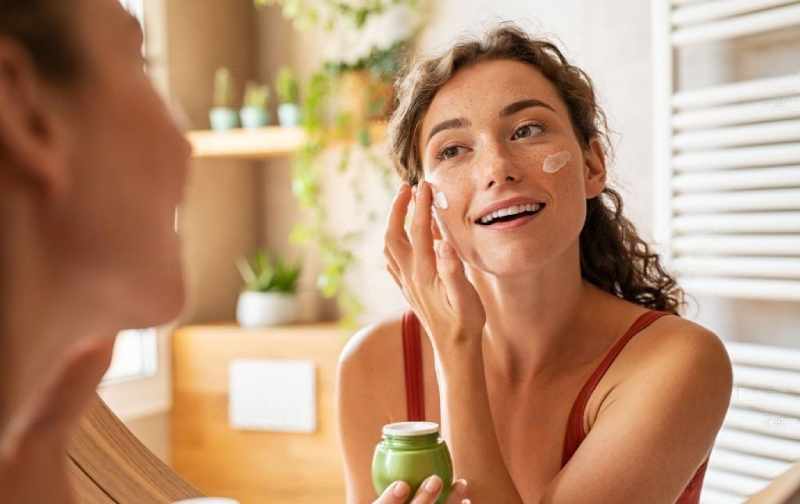It is insufficient to use high-quality skin care products. For your products to function at their best, you must also use them correctly. Your products’ routine will be impacted by how they are thru, the time of day, and your skin type. Applying in order of texture, from thinnest to thickest, is a good idea because lighter products won’t be able to penetrate thicker ones.
The perfect care routine in 9 steps
Whether you have a three-step routine or a nine-step routine, there’s one thing everyone can do to step up their skincare routines: apply products in the correct order. Whatever your skin concern, you should start with a clean, toned foundation, use concentrated actives, and finish by locking in moisture and all-day SPF. Here are the steps to good skin care:
1. Wash your face.
Bleach your face with water in the morning and evening, then gently massage a tiny amount of the gentle cleanser between your palms. Use the facial cleanser to massage your face gently. Rinse your hands and gently rub water over your face to remove any detergent or grime. Use a soft cloth to pat your face dry gently. If you use makeup, you might need to wash your face twice at night. Use micellar water or makeup remover oil first to remove your makeup. To remove eye makeup and prevent rubbing your eyes, try leaving on particular makeup removers for a few minutes. A light face-cleansing then follows you.
2. Apply toner.
If you use toner, apply it after cleansing your face and before anything else. Pour a few droplets of cleanser into the palms of your hands or onto a cotton ball and gently wipe your face. If your toner is exfoliating, meaning it removes dead skin cells with ingredients like glycolic acid, uses it only at night. Moisturizing formulas can be cast-off twice a day. Do not use exfoliating toner and retinoids or other exfoliants simultaneously.
3. Apply serum.
Skin. Morning is the perfect time to use a serum rich in antioxidants, such as a Vitamin C Brightening Serum, as they protect your skin from the free radicals you will encounter throughout the day. The evening is a good time to use a hydrating serum that contains hyaluronic acid, which helps prevent skin from drying out overnight, especially if you’re using anti-aging or acne treatments that can irritate and dry out the skin. Serums may also contain exfoliants such as alpha hydroxy acids (AHAs) or lactic acid. Whatever you use, always remember: water-based serums should be cast-off under moisturizer; Oil-based serums should be helpful after your moisturizer.
4. Apply eye cream.
You can smear regular night skincare cream to the under-eye area. Still, if you decide to use a specialty eye cream, you should generally apply it under the moisturizer, as eye creams tend to be thinner than eye creams. Try an eye cream with a metal ball applicator and keep it in the fridge to counteract pompousness in the morning. Applying an eye moisturizer at night can cause water retention, making the eyes look puffy in the morning.
5. Use a spot treatment.
It’s a good idea to use acne treatments at night when your body is in reparation mode. Instead, ensure you do as much as possible to soothe and moisturize your skin. Beware of layering acne-fighting ingredients like benzoyl peroxide or salicylic acid with retinol, which can irritate.
6. Hydrate.
The moisturizer hydrates the skin and seals in any other layers of product you’ve applied. Look for a light morning lotion, ideally with an SPF of 30 or higher. In the twilight, you can use a heavier night cream. If you have dry skin, you should use a cream morning and evening.
7. Apply retinoids.
Retinoids (derivatives of vitamin A, including retinol) can reduce dark spots, blemishes, and fine lines by increasing skin cell turnover, but they can also be irritating, especially on sensitive skin. If you use retinoids, be aware that they break down in the sun, so you should only use them at night. They also make your skin more delicate to the sun, so sunscreen is a must.
8. Apply facial oil.
If you use a facial oil, apply it after your other skincare products. Otherwise, nothing can penetrate the oil.
9. Apply sunscreen.
Skin cancer and ageing symptoms can be forbidden by protecting from UV radiation. Even though it’s the last, almost all dermatologists will agree that sun protection is crucial for any skincare regimen. Look for sunscreen with a broad-spectrum SPF, which will shield you from UVA and UVB radiation. You must still use sunscreen even if your moisturizer doesn’t have an SPF. Wait 20 minutes for chemical sunscreens to start working before venturing outside.
Also read:11 Natural Treatments to Curl Frizzy Hair
